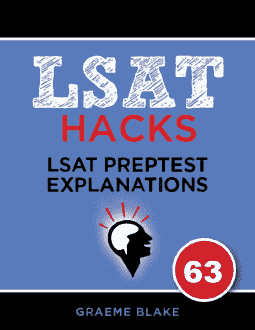QUESTION TEXT: Energy analyst: During this record-breaking heat wave…
QUESTION TYPE: Paradox
PARADOX: Air conditioning use during a heat wave threatens to cause blackouts. Residents have been asked to cut back on air conditioner usage to help with the blackouts. But blackouts will probably happen anyway even if they do cut back.
ANALYSIS: If air conditioners are the problem then we need to figure out why shutting off residential air conditioners won’t help.
The right answer explains that businesses and factories also use air conditioners. Those are likely to be important to the success of the business and they are less likely to be shut off. The authorities were only asking residents to shut off their systems.
___________
- Of course air conditioners aren’t the only things that use electricity. But it’s specifically extra air conditioner use that has overloaded the system and added extra demand. If consumers cut A/C use then why doesn’t power consumption drop to normal? We’re not told that anything else is using more power than normal.
- CORRECT. Here we go. Factories and businesses aren’t likely to cut back on air conditioning: otherwise they might lose customers and/or their factory machines factory machines might break from overheating.
- That’s nice. But the authorities didn’t propose this solution, and it doesn’t seem likely to work in the short term. This does nothing to explain why a voluntary cutback of A/C use couldn’t also work.
- This is very tempting. But the stimulus says the blackout will happen even if the residents do cut back.
- Excellent. But the stimulus says we should expect blackouts until the heat wave ends. This doesn’t help explain why.


Why is A worng? The question says “If true,” meaning that it was not true in the question. So, if the answer says there is another SIGNIFICANT drain on the electric system (where this was not true in the stimulus), why should that not be just as effective as the air conditioning to cause blackouts?
If true doesn’t mean that. It could be true, but the answer makes it true. But we can’t assume A is false if we pick another answer.
As for why A is wrong, suppose you have this distribution:
110% usage
Air conditioning: 15%
manufacturing: 20%
Home electricity: 25%
etc
If you eliminate air conditioning, demand goes under 100%. A doesn’t show why cutting AC wouldn’t work. We would actually expect there to be many significant drains on the grid. The key with AC is it is a new *temporary* burden on the grid that can lead demand past capacity.
Note: This is an old comment but I wanted to clarify the point.
Good job on your score, nevertheless you’re making a lot of assumptions in your thought process that don’t actually come from the stimulus itself. There could be something else that is draining the electrical system so much that cutting down air conditioning in homes won’t be enough, which makes A like a probable answer. The issue is that answer B is just much stronger of an explanation. Thats why its the answer.
On the LSAT you’re allowed to use reasonable outside assumptions if *everyone* would agree with them. For instance, here are some assumptions I’m making for A:
* There are regular users of the electricity systems, including major ones
* The electrical system is not in a state of constant blackouts
No one would disagree with those assumptions. The LSAT doesn’t require you to abandon all common sense and information about how the world works. “Overloaded” in the stimulus implies that air conditioning is taking demand to a higher level than normal.
A just tells us something we could already assume, and so it doesn’t really strengthen the argument. It would be very very strange to imagine a world where the electrical system has no significant uses.
Note: This is an old comment but I wanted to clarify the point.
your lsat explanations are so helpful- you’re the man!
in this explanation, i think the answer is right simply because the argument asks residents to turn off A/C, and if businesses are the main consumers of energy, then the power outages will still occur.
Hi Louis,
You’re definitely right- the stimulus doesn’t say anything about businesses being asked to reduce their A/C use, so (B) resolves the discrepancy really easily. Businesses aren’t likely to cut back their A/C use unless someone asks them to, for the reasons Graeme noted above, and if they’re the ones using most of the A/C, power will still go out.
Thanks for the comment!